The hidden guru behind TV’s biggest shows
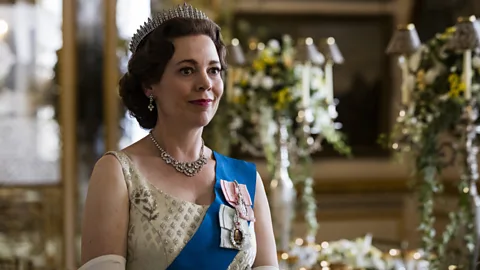
Her role is not seen, yet the acclaimed casting director Nina Gold creates stars and megastars – and shapes what we watch on television and in film. She talks to Lindsay Baker.
There is a moment at the climax of episode three in the new series of The Crown when the camera zooms in and lingers on the face of Olivia Colman as the Queen. We watch her expression as she listens to a recording of a hymn sung by the bereaved families of those killed in the devastating Aberfan mining disaster. Without saying a word and perfectly still, Colman’s expression conveys to the viewer the monarch’s lifetime of stiff-upper-lip English reserve and a faint rumbling under the surface of her regal, stoical demeanour. Then, as a single tear falls silently down her cheek, the episode ends.
More like this:
This quietly expressive quality was one reason why Nina Gold, casting director of The Crown, was keen to have Colman for the role. “I’d say the ability to express inner emotion wordlessly is pretty important for portraying most roles,” Gold tells BBC Culture. “I find that we, the public, ascribe quiet stoicism to the Queen but of course, we don’t really know what the actual Queen is like in her personal life, so the character of the Queen in private is a fictional construct. But Olivia Colman playing her with quiet stoicism is great, and is definitely a version of the Queen that we find very believable. Apart from being a brilliant actress, I think Olivia’s ability to reveal her humanity and empathy – and the access she gives us, the audience, to the workings of her mind – were a big part of what makes her so right for this part.”
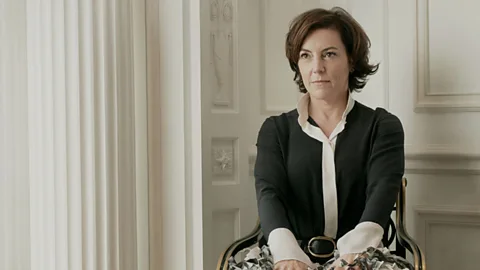 Bafta
BaftaThe London-based Gold excels at the nuanced alchemy of casting – often fitting unexpected actors with roles that somehow they end up seeming born for. Arguably the most influential casting director working today, the aptly-named Gold has, it seems, the golden touch.
She began casting while she was still at university, studying at Christ’s College, Cambridge. A friend in London asked her to be an extra in a music video and then to help with recruiting extras for an AC/DC video. She kept going, casting commercials and music videos, and then in 1992 a McDonald’s advert – directed by Mike Leigh. A few years later, Leigh brought Gold in to help with casting his Gilbert and Sullivan biopic Topsy-Turvy, her first major film.
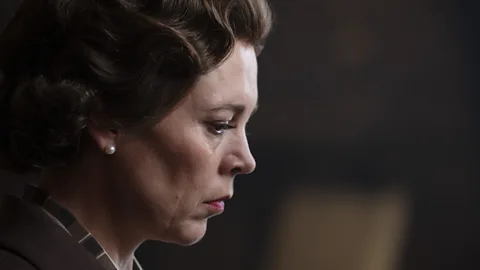 Sophie Mutevelian/ Netflix
Sophie Mutevelian/ NetflixSince then, it has been one hit casting after another, from Eddie Redmayne as Stephen Hawking in The Theory of Everything – for which he won an Oscar – to Anne Hathaway in Les Misérables, and John Boyega and Daisy Ridley in Star Wars. Her extraordinary career has spanned several decades, and includes 176 casting credits on award-winning films and TV series from most of Mike Leigh’s films to Star Wars and Game of Thrones; The King’s Speech to Mamma Mia!; and the Jurassic World sequels to the Paddington movies. In recent years, Gold has won five Emmys, been nominated for another nine, and in 2016 was awarded a Bafta special award. Gold has launched and accelerated many actors’ careers – and what she does is a crucial part of the filmmaking process, because, quite simply, the right casting choices will make us believe what we are watching.
 Des Willie/ Netflix
Des Willie/ NetflixThere is a subtle, barely perceptible kind of magic about what Gold does – the best casting should be unnoticed, and the right choice of actor should seem, with the benefit of hindsight, perfectly obvious. In other words, casting should only really be noticed when it is wrong. In The Guardian, Peter Morgan, the creator of The Crown, described Gold as a benevolent pickpocket. “You walk in and you have a pocketful of what you think are brilliant ideas,” he said. “By the time you leave you have none of those ideas any more, and your pockets have been replaced with other stuff which you then find out is inevitably better.”
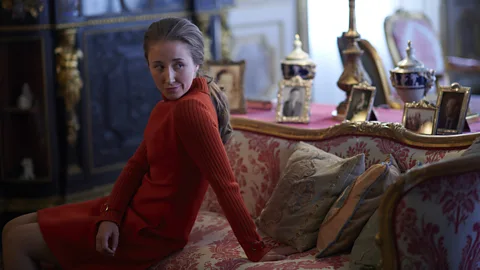 Des Willie/ Netflix
Des Willie/ NetflixYet casting is an aspect of film and TV making that is comparatively un-feted – there is, for instance, no Academy Award devoted to it. So how does the process work? With the latest Crown season, did all actors have to audition? “No,” concedes Gold. “I guess it’s fair to say that there’s a small number of actors who are at a level and whose range and variety in their body of work meant they didn’t have to.” And how about the final casting decision – is that down to Gold, or does the director have the final say? “It’s a collaborative process, like all the good parts of film making. Peter Morgan [creator and writer of The Crown] and I talked about the casting of Olivia as the Queen for a good couple of years, long before we needed to start making a decision, but it was a very interesting thing to think about.”
In contrast to Colman’s clipped, purposeful, understated restraint is the flamboyant, sybaritic performance by Helena Bonham Carter as her on-screen sister, Princess Margaret – a contrast that makes for great drama. How did that come about? “It came about as the result of multiple conversations with Peter about her and Princess Margaret. There is always a process and a lot of making sure that one hasn’t failed to think of all the other possibilities, but it seemed pretty clear that Helena would be fantastic as Princess Margaret. And we had always thought that Tobias [Menzies] would be excellent as Prince Philip.”
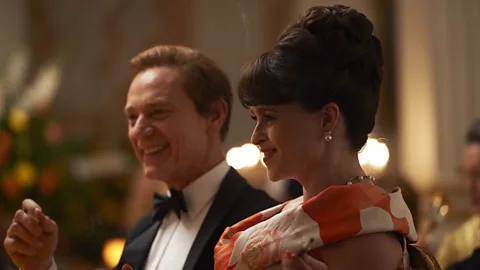 Des Willie/ Netflix
Des Willie/ NetflixThere are also advantages to casting actors who are less well-known, says Gold, as it makes it easier for the actor to disappear into the role. “I guess there’s no baggage or association with another part or show to have to get over.” Some of the younger royal roles have been assigned to rising stars – Josh O’Connor plays Prince Charles – and to relative newcomers, such as Erin Doherty as Princess Anne. “We had a pretty extensive audition process for some of these parts. With the younger parts, Robert [Sterne, who works alongside her on the series] and I met quite a lot of newer actors ourselves, and then Peter and the director met and auditioned the shortlists. And we had been thinking about Josh O’Connor for quite a long time.”
Signifiers of class
One of the challenges with the series, says the casting director, is that she must cast for roles that span an age range of a decade or more – season three takes place between 1964 and 1976. “There are moments when one thinks that it’s impossible to get it right – who can be the right person to play 45 and 58 at the same time? But then the actors can really do a lot with the nuances of their performance, and I think as long as the casting means that the characters start in roughly the same place and age together, the problem seems to disappear.”
And then there is the challenge of casting the roles of real public figures, who we feel in a sense we know, and many of whom are still alive. “I think one has to that it’s impossible to please all the people all the time,” she says. “The best we can do is cast actors who are going to portray them as real human beings. We don’t really know the real person behind the public figure as well as we imagine we do, so the actors have to bring their own version of the character to life, and play it truthfully.”
Gold grew up in Cardiff in the 1970s – did her own childhood memories of that time play a part in her choices for The Crown? “I have a general memory of the feel of the 1970s and a few highlights of political events, but not much about the Royal Family. I got more awake around the time that punk arrived… But I the Prince Of Wales’s investiture fondly, even though I was very young, [from] growing up in Wales, as there was a party. I’ve still got the mug.”
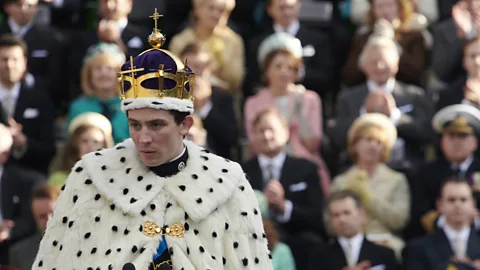 Des Willie/ Netflix
Des Willie/ NetflixIt is in the small gestures, postures and diction that authenticity is found – and capturing the nuances of class is of course a big part of The Crown actors’ job. What are some of the signifying elements when casting royal and aristocratic roles, and how does Gold ensure authenticity? “The signifiers of class are so tiny and nuanced and subliminal and numerous, in real life as much as in acting,” she says. “We are all very attuned to them without even realising it, and I think the actors are very aware of the need to get those tiny details right. It’s also really hard to act across social classes, I think, and only really clever and good actors can do it well – which is one of the reasons why casting The Crown is quite complex.”
Choosing who would play the role of the then-Lady Diana, a figure of huge global resonance, must have been daunting – she will be appearing in season four. How did Gold decide on Emma Corrin – plucked from relative obscurity – for the role? “We had met her for a small role in something else, and were struck with how good she’d be for Lady Diana. So then we put her through a rigorous audition process and met a lot of other, also really interesting, contenders, and in the end she got the part.” Needless to say, Corrin’s career is now set to be huge.
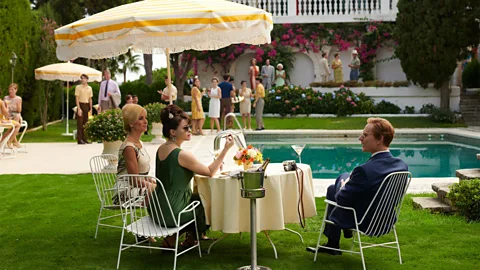 Des Willie/ Netflix
Des Willie/ NetflixQuietly, unobtrusively, to make careers, to turn actors into stars – and stars into megastars – must be gratifying – and Gold concedes there is a kind of nurturing in what she does. Though, fittingly for a master of the invisible casting arts, the low-key Gold seems to prefer that the actors she chooses are in the spotlight rather than her. “Yes. It’s amazing to watch a talented young actor develop and grow, and fantastic to encourage them and be able to be a part of it. I have a lot of iration for their ability to put themselves out there and their vulnerability during the process – not only just in trying to get the part, but also in actually doing it. I could never do it – they’ve got guts.”
The Crown season 3 is available on Netflix.
If you would like to comment on this story or anything else you have seen on BBC Culture, head over to our Facebook page or message us on Twitter.
And if you liked this story, sign up for the weekly bbc.com features newsletter, called “If You Only Read 6 Things This Week”. A handpicked selection of stories from BBC Future, Earth, Culture, WorkLife and Travel, delivered to your inbox every Friday.
